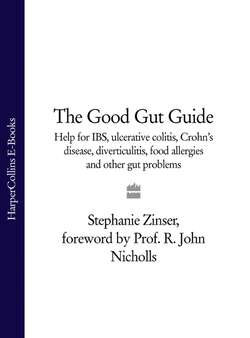Читать книгу The Good Gut Guide: Help for IBS, Ulcerative Colitis, Crohn's Disease, Diverticulitis, Food Allergies and Other Gut Problems - Stephanie Zinser - Страница 30
What Can Mucus Be a Sign Of?
ОглавлениеIn itself, mucus is an innocent and harmless by-product of the digestive process. But there are occasions when we may notice it. If we’ve been unwell and not eating, it is possible that some mucus will be visible when we open our bowels, although it will still be mixed up with other body secretions, like bile from the gall bladder. People who have had their colon surgically ‘disconnected’ from their anus always notice that they start to discharge mucus from their tail end. It was ever thus, but once waste food matter is no longer being shunted through the anus, the one thing that is still being produced in that area – mucus – becomes very obvious.
Haemorrhoids are probably the most common cause of mucus discharge from the anus. Other causes of mucus include proctitis, polyps, anal fistulas, rectal prolapses, ulcerative colitis, bowel and anal cancer. Intussusception – a problem seen in young infants – causes red, jelly-like stools or bloodstained mucus. Even IBS can stimulate areas of the gut to produce more mucus. (It is interesting to note that IBS often used to be called ‘mucous colitis’.)
